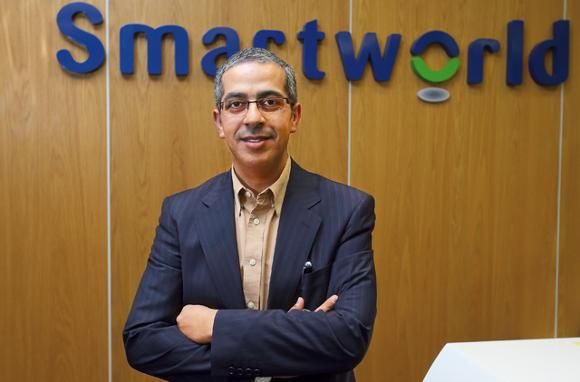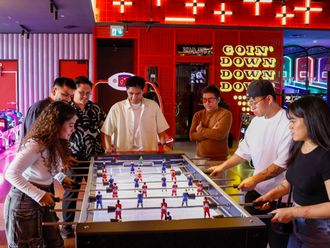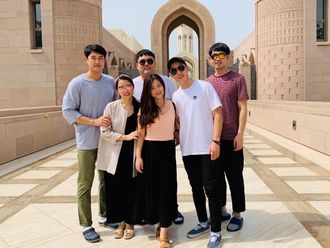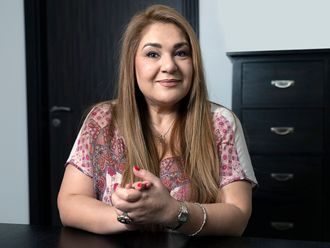
As he bounds across Smartworld’s office, 42-year-old Reyadh Ayesh looks more like an enthusiastic worker preparing for the weekend than the company’s CEO working out strategies to make it the third telecoms operator in the UAE. Appearances can be deceiving.
Reyadh’s first employer in Jordan agreed to take him on when he offered to work for free to gain experience after graduating in engineering, but within two months he not only paid Reyadh his full salary, but also put him in charge of establishing an office in Dubai.
He made such a good job of it that he is now managing director and chief executive officer of Smartworld, a part of Dubai World Central, an initiative of the Government of Dubai.
“I know I will make some mistakes, but I use them as opportunities to learn,” says Reyadh. Here he tells Friday what makes him tick.
Work
Determination and a clear head are the qualities needed to succeed. I was very clear from the beginning that I wanted to be an engineer. I also wanted to be more than just a career engineer. So I took the opportunities presented to me – observing my father in his small textiles business after school, assisting my brother in his construction work – all of which gave me a very clear picture of what I had to do to get ahead.
When I graduated in 1993, I decided that I would gain experience any way I could, even if I had to work without getting paid for it, and I did exactly that.
I worked for free with the Systems and Electronic Development Company (Sedco), one of the two companies in the world that customised everything, fromb mainframe computer systems to peripherals, for Arabic users. We catered to most of the government institutes in the Arab world.
I had been there just two months when the owner decided I was worth a proper salary and suggested I set up and head an office in Dubai. It took a year and a half for us to establish the company here in 1995.
I am grateful to the owner of this business. He helped make me a success, he mentored me as a fresh graduate and guided me. Without his guidance it would have taken me seven years at the very least to establish the company.
It was like a crash course – a huge jump from being a technical engineer to becoming a business owner representative. I learnt everything; right from establishing a relationship with banks to liaising with the Jebel Ali Free Zone Authority.
When it took off, the start-up growth was phenomenal. Our market share grew fast and we cornered almost 95 per cent of the UAE market. We catered to almost every government department that needed the product.
I wanted to move up, and the chance came sooner than I expected when one of our clients saw potential in me and decided to give me a chance. When a dedicated IT department was established at the Department of Civil Aviation, I was headhunted to join them in 1999.
I used the experience I gained to good effect in my new job. It was essentially the same job of establishing a new department. This meant analysing costs, sourcing equipment and personnel, setting goals and realising them. After successfully computerising the department’s operations internally, we were moved to bigger projects.
In 2004 there was a project to develop an airport to handle extra capacity or business for Dubai International Airport. Six people were chosen – three from the IT department and three from the civil engineering department – for the design and execution of the project. I was one of them.
It was completed in 2005. At the end of the year, the Dubai Aviation Corporation, branded as Dubai World Central (DWC) was formed.
So our department was hived off to the DWC.
This was when I realised that nobody could rest on their laurels. It was a new area I was told to take care of and I couldn’t just wing it on my past experience. I had to start all over again, and at that point I realised what is absolutely essential to become successful and to keep building on my successes – always remain a student and keep learning.
So I honed my skills to work as the manager of such a large project. I got certified and accredited as a project management professional by the prestigious US-based Project Management Institute (PMI).
At DWC I became head of the project management office (PMO), and a year later in 2007 the vice-president of the PMO. This marked a turning point in my career and lead us to establish Smartworld – which will hopefully become the third telecoms service provider to the nation, and be operating worldwide within a few years.
I was made managing director of Smartworld in 2007, and when the CEO quit in 2009, I was nominated to that position early last year
to manage until we hire a new incumbent.
Then I will be able to move on to bigger things.
We’ve been very successful in making it a profitable venture. We’ve proved equal to global operators in the field. We are now bidding for projects in Abu Dhabi International Airport.
I lead by example. It’s a cliché that leadership is different from management. Managing people is an operational function, whereas as a leader you have to show them the way to do something. If you are wrong then the entire team gets it wrong. But if you get it right then you reap the rewards.
I guess I had this streak in me right from childhood. Even while in primary school I used to go to my father’s office after school and observe the way he worked. It taught me how to manage available resources, and get maximum benefits from what I had.
I would also accompany my older brother – who is a civil engineer – on his projects. I got so efficient at managing his sites that when I was in high school he allowed me to complete a project – a villa – all by myself. That was where I got my confidence from.
My belief is if you don’t enjoy what you are doing, you will never succeed. I keep telling my team you have to convince yourself that you love your job, and if not please change your job.
Most people who work with me find my working style very strict initially. I have very exacting standards and expect my staff to adhere to them. If you have been used to a certain style of functioning, you’ll find it difficult to conform to what you feel is a more restrictive style.
But as my staff got used to working with me and saw that they were meeting their targets regularly, they realised the efficiency of my methods. In fact, my team now works so much like me that when they go out to deal with others they are told they do things exactly like I do. Everybody says there are so many copies of me in my company!
I am the same person at work as well as home. You can’t be two different people; it would be living a lie. I tell my kids they don’t need to memorise, just understand what they have to learn. Only then will they be able to apply what they learn to any situation.
Managing change is crucial to any project.
I am very good at that and I take it upon myself to teach that to my team.
I believe if we don’t run fast and to our full capacity we’ll be left behind. That said, you can’t win all the time. There will be times when you fail and I always use those as chances to learn.
I believe in always factoring in some leeway for changes that may occur at a later stage so that you are not caught off guard.
Although you should be aware of your strengths and weaknesses, you should not make a case for them either. If I mention my weakness it becomes obvious. If I believe in my strength too much I may become lazy. I prefer to call strengths and opportunities enablers, and weakness and threats advantages that we should work on. Our company’s strategy document incorporates these two terms.
Play
I grew up in Amman, the capital of Jordan, and I studied in a school sponsored by the UN.
I excelled in school and graduated in electronics and computer engineering from Cairo, Egypt.
My father, Mohammad, had the biggest influence on my life. I am the youngest of nine children – six boys and three girls. I observed the way he brought up my siblings, so I had eight life lessons from him! He’s 85 now. He ensured that all of us graduated and five of us are now post graduates.
Socialising is very important, especially in a city like Dubai where you have so many different nationalities. It was really challenging for me in the beginning. But since I started community service through PMI, a multinational non-profit organisation, I have really enjoyed establishing relationships with strangers. It taught me to interact with people.
My voluntary work with PMI has added a new dimension to my life. Every engineer aims to get accredited by this organisation as it’s certification is recognised by giants such as Nasa and General Electric.
It’s only possible to get accredited through mentoring by a local team volunteer who helps them gain the experience required to become eligible for the certification. That is what I do in this region.
I like travel and socialising. We recently went as a family to Düsseldorf, rented a car and drove all the way to Luxembourg, then to France, Spain and Portugal, where we spent a week.
We then came back across Europe a different route. We spent a couple of days in each country and made it a point to meet the people and get to know them.
It’s become a hobby for me to travel by road in any country I visit – I think it’s the best way to get to know its people and the culture. In 2010 I took a long-term view of where I’d be in my fifties and decided to complete my master’s in multicultural project management. Now I am working on a PhD in the same subject.
I relax the most when I travel to the countryside – unspoilt greenery is a must.
Even a beach must have some element of greenery to interest me.
I just love driving. Though I haven’t attempted racing cars yet, I go to races like Formula One and I do some desert driving with my kids. I also do some go-kart racing with some racing clubs in the eastern part of Egypt.
Dream
Writing a book is a dream I’ve had for some time. I will make that come true shortly, along with another dream – getting a doctorate.
One of my personal dreams is to make sure my children are stronger and more independent than I am. I started from zero for every milestone in my career. I had to work for free to get experience; I had to start from scratch when we wanted to establish Sedco in Dubai. It was real hard work. I’d like them to have an easier start in life. Where Smartworld is concerned, I dream of it becoming the third telecoms operator in the UAE after Etisalat and du.
I would like to see Smartworld become a leading telecoms company on a global scale.
It may be hard, but not impossible. This should become possible within five years.












